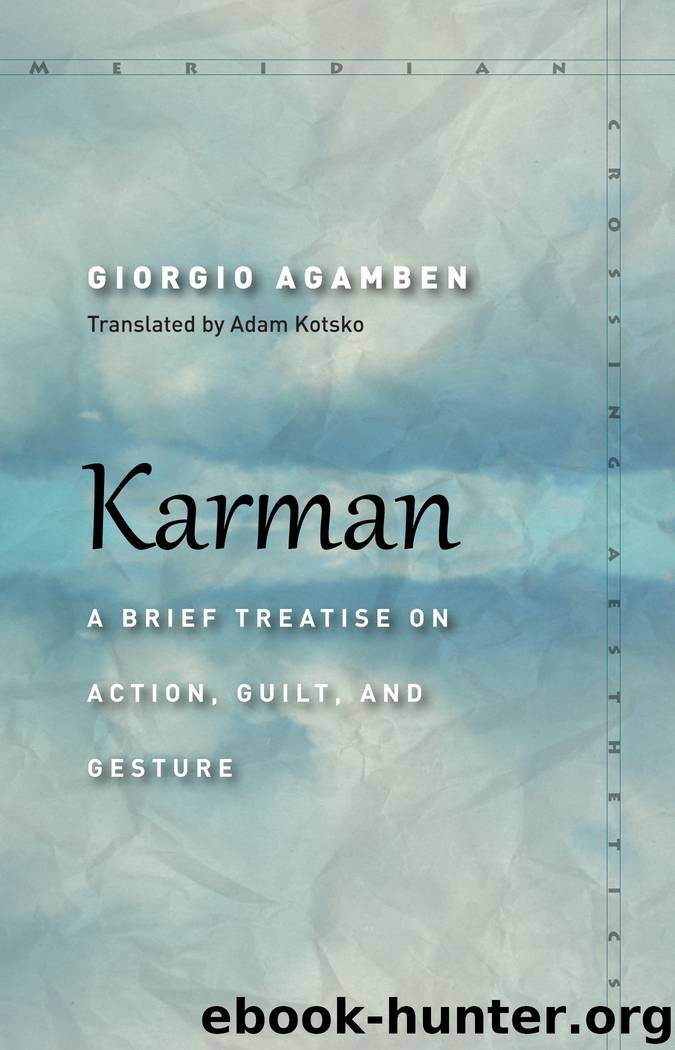Karman by Giorgio Agamben

Author:Giorgio Agamben [Agamben, Giorgio]
Language: eng
Format: epub
Publisher: Stanford University Press
Published: 2018-04-14T16:00:00+00:00
§ 4 Beyond Action
1. The politics and ethics of the West will not be liberated from the aporias that have ended up rendering them impracticable if the primacy of the concept of action—and of will, which is inseparably jointed to it—is not radically called into question. This is all the more urgent since in one of the studies that has exercised the most influence on twentieth-century political philosophy, Hannah Arendt’s The Human Condition, the rank of action in the public sphere is still forcefully affirmed. And yet an attentive reading of the chapter of the book dedicated to this concept shows precisely that the author does not succeed in furnishing a coherent definition for it, as if—as one could in any case infer from its absence from the most authoritative philosophical lexicons—it were not properly a philosophical term. The Latin term actio, which translates the Greek praxis, originally belongs, after all, to the juridical and religious sphere, not the philosophical. In Rome, actio designates the trial and actionem constituere means, like agere litem or causam, “to institute proceedings.” On the other hand, the verb agere originally means “to celebrate a sacrifice,” and in the most ancient sacramentaries, the mass is also called actio and the Eucharist actio sacrificii.
In the entire history of Greek philosophy, Arendt can thus cite only the Aristotelian opposition between poiēsis, which has its work (ergon) and end outside itself, and praxis—action—which has its end in itself (“praxis and poiēsis are different in kind. . . . For the end of poiēsis is different from itself, but the end of praxis could not be, since acting well [eupraxia] is its own end”; Nicomachean Ethics, 1140b). And it is precisely by means of the Aristotelian opposition between making and acting that Arendt seeks to define action (which in her exposition is inseparable from speech and discourse). In this connection, she evokes, while interpreting it as “end in itself,” the concept of energeia, “actuality,” in the sense of being in act, with which Aristotle designated all those activities that do not pursue an external end and do not leave behind any works: “It is from the experience of this full actuality that the paradoxical ‘end in itself’ derives its original meaning; for in these instances of action and speech the end (telos) is not pursued but lies in the activity itself which therefore becomes an entelecheia, and the work is not what follows and extinguishes the process but is imbedded in it; the performance is the work, is energeia. Aristotle, in his political philosophy, is still well aware of what is at stake in politics, namely, no less than the ergon tou anthrōpou (the “work of man” qua man), and if he defined this ‘work’ as ‘to live well’ (eu zēn), he clearly meant that ‘work’ here is no work product but exists only in sheer actuality” (Arendt, pp. 206–7).
That in the passages to which Arendt refers Aristotle did not have in view a definition of action but rather
Download
This site does not store any files on its server. We only index and link to content provided by other sites. Please contact the content providers to delete copyright contents if any and email us, we'll remove relevant links or contents immediately.
Never by Ken Follett(2873)
The Man Who Died Twice by Richard Osman(2290)
Machine Learning at Scale with H2O by Gregory Keys | David Whiting(2265)
Fairy Tale by Stephen King(2058)
Will by Will Smith(2033)
Reminders of Him: A Novel by Colleen Hoover(1869)
The Dawn of Everything: A New History of Humanity by David Graeber & David Wengrow(1564)
The Stranger in the Lifeboat by Mitch Albom(1529)
Friends, Lovers, and the Big Terrible Thing by Matthew Perry(1324)
The Becoming by Nora Roberts(1323)
New Morning Mercies: A Daily Gospel Devotional by Paul David Tripp(1301)
A Short History of War by Jeremy Black(1295)
HBR's 10 Must Reads 2022 by Harvard Business Review(1251)
The Strength In Our Scars by Bianca Sparacino(1234)
The Fall of Babel by Josiah Bancroft(1231)
Go Tell the Bees That I Am Gone by Diana Gabaldon(1231)
Can't Hurt Me: Master Your Mind and Defy the Odds - Clean Edition by David Goggins(1219)
515945210 by Unknown(1205)
Love on the Brain by Ali Hazelwood(1088)
